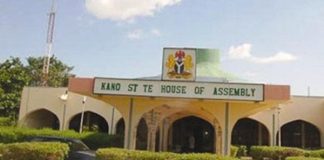🌿 Ruzu Non-Alcoholic Herbal Bitters
Ruzu Non-Alcoholic Herbal Bitters is a natural health supplement specially formulated to:
- ✅ Promote general wellness
- ✅ Detoxify the body
- ✅ Support the treatment of various ailments
Made from a powerful blend of 100% organic and medicinal herbs, Ruzu is completely alcohol-free, making it ideal for:
- 👪 All age groups
- 🌱 Health-conscious individuals
- 🌿 Anyone seeking non-alcoholic herbal remedies
Whether you're looking to boost your vitality, cleanse your system, or support healing the natural way, Ruzu Bitters offers a trusted herbal solution.
The Federal Government’s decision to commence the implementation of the Electronic Money Transfer Levy (EMTL) on December 1 may have provided another opportunity for some money transfer agents, Point of Sale (PoS) operators and filling stations across the country to make brisk business at the expense of Nigerians.
Checks by Saturday NaomisophyBlog among some PoS operators and filling stations in the past few days revealed a substantial abuse of the application of this new policy among the critical players in the nation’s financial space.
For instance, while the Federal Government, through the Finance Act 2020, only stipulated a one-off levy of N50 on recipients of electronic transfers of N10,000 or more, checks by Saturday NaomisophyBlog revealed that some owners of filling stations and money agents have different interpretations of the policy, which took effect from December 1 after experiencing some hiccups a few months ago when it was originally billed to commence.
Implementations of new policy are always skewed against Nigerians. In some cases, a volume of transaction exceeding N5,000 attracts a levy of N50, contrary to the Act which specifies N10,000 or more before such rule can apply.
At a filling stations situated in the Atan area of Ado Odo Ota Local Government Area of Ogun State, customers desirous of buying any petroleum product were being charged N50 extra, even for a transaction that was less than N10,000 when Saturday NaomisophyBlog visited.
“We are doing this because the fintech company we use charges us, even when the transaction is less than N10,000. As long as it is more than N5,000, we’ll be charged,” the fuel attendant explained to our correspondent who had posed as a customer.
When confronted with the fact that government only recommended N50 for a transaction from N10,000 and above and that no fintech would be that daring to flout such directive of the government, the attendant simply referred the correspondent to the station manager who in turn said the workers there were simply carrying out “order from above.”
But while that branch of the filling station had the audacity to flout the new law with impunity, Mr. Jamiu Jimoh, a Lagos-based mechanic explained that some filling stations do that by proxy.
“There is an independent filling station very close to where I live around Joju Bus Stop in the Sango area of Ogun State. Their PoS terminals are permanently down. They ask you to pay cash or go to PoS operators loitering around the filling station, who will make you pay all these levies under the guise of complying with the Federal Government’s new directive on electronic money transfer. While pretending to be aboveboard, the filling stations are actually working with these operators and one cannot be sure that the PoS terminals don’t belong to the filling stations,” he stated.
Rachael, who operates a PoS centre at Iyana Ipaja, a Lagos suburb in Alimosho Local Government Area, was ready to defend these charges. She was quick to attribute the increase in her charges even when the amount involved was less than N10,000 to the new policy.
The 25-year-old National Diploma in Marketing holder charges N200 on N5,000 transaction and N300 on transactions beyond N5,000 but less than N10,000. Any volume of transaction that is N10,000 or more attracts more charges.
According to her, the introduction of the new N50 levy, coupled with scarcity of cash, has been the reason for the hike being witnessed on PoS transactions of late.
“We don’t run a philanthropic organisation. Customers should have known that they would definitely pay more since the implementation of the policy began. I think what the people complaining now should have done then to demonstrate against the policy when it was announced. All these accusations should have been directed at the government that introduced this policy in the first place. It is definitely not our fault; we would not charge this type of levy if there was no cause to do that,” she added.
But Adams Makinde, a frequent user of the PoS services, disagreed. The Lagos-based fashion designer believed the new policy is being glaringly exploited by some unscrupulous Nigerians to feather their nests.
“Let us agree the introduction of the new levy should come with a slight increase in the charges of electronic transfer, but how do we explain a situation where some PoS operators charge the levy on an amount that is far less than the sum of N10,000, the amount stipulated by the Federal Government?” he said.
Giving a personal experience, Makinde said he was recently charged an extra sum of N150 by a shop owner under the guise of money transfer levy.
“I was actually in the shop to buy some sewing materials close to N30,000. To my surprise, the shop owner insisted that I must pay N150 as transfer levy. I knew this was not right and I told the shop owner so. But the option she gave me was to go and look for cash to make the payment if I wasn’t satisfied. I had to pay,” he stated.
Curiously, Mama Ade (real names withheld), who runs a PoS centre around Idedo, in Ado Odo Ota Local Government Area, agreed with Makinde that some of her colleagues were exploiting their customers on the excuse that they were obeying the Federal Government’s new directive.
According to her, while it is true that some fintech charge N50 on electronic transfer, no fintech will ever charge the amount for any transaction not up to N10,000, contrary to the claims by money transfer agents.
“Besides, the levy is supposed to be a one-off. It is N50 for any amount that is N10,000 or more. No agent should therefore charge their customers more than N50, irrespective of the amount involved.
“I think we are just being difficult as a people. For instance, the N50 levy is something one can even overlook as PoS operator. In my own case, what I advise customers that come with the intention of doing a N10,000 transaction is to do N9,999. That way, the question of a N50 levy wouldn’t even arise in the first place,” she added.
Mama Ade’s stance on the vexatious issue was supported by Wasiu, another fuel attendant who craved Saturday NaomisophyBlog’s indulgence to withhold the name of the Lagos-based filling station where he worked.
According to Wasiu, his filling station would not charge customers any extra levy besides the amount of fuel they are buying because their financial institutions do not charge them.
“We may charge if it is a transfer; since we are also being charged for that type of transaction. But if you are using your ATM card, we do not charge,” he stated.
He also wondered why PoS operators would take advantage of their customers under the guise of implementing the new policy.
“They come to us regularly to source for cash and we give them cheaper than they get in the banks, so why make life difficult for Nigerians? Some of them are just being greedy and they will continue to be so until steps are taken to put them in check,” he added.
For John Oluwatuyi, a marketing communications practitioner, the government needs to do more than a pronouncement of the policy. He asked the government to embark on an enlightenment campaign to educate Nigerians on what the policy is all about and the need to report infractions whenever any is committed.
“I’m sure the idea behind this levy is not to further complicate issues for the over-burdened Nigerians. But what we are seeing now is capable of misrepresenting the intention of the government, before the people. I believe if the people are sensitized on this very important issue, they will know what they should do when they are about being exploited by any of these people,” he stated.
But Salako Ayeni, a financial expert, believed that besides misrepresenting the government, the activities of these PoS operators might negatively impact the cashless policy of the Federal Government.
“What we are witnessing here in the past few weeks, since the implementation of the policy began, is multiple taxation of customers on that space. Unfortunately, once Nigerians begin to have the idea that they are being charged from all fronts for every electronic money transfer, as being seen here, they may begin to think of alternatives to electronic banking, and such development will definitely not help the cause of cashless policy in Nigeria,” he stated
A banker, who would not want his name in print, described the development as negative for the banking industry, and would want it quickly nipped in the bud.
“This should not be happening at a time when the banks are having some form of incentives for customers, using the electronic payment platform for their transactions. Banks do that because they want traffic in that direction. But this recent development is a major disincentive to whatever efforts the nation’s financial institutions are making to stimulate activities in that direction.
“The activities of these PoS operators may throw spanner in the works of these banks. That is the reason why I believe that the relevant regulatory agencies in the industry must take action now before it is too late,” Ayeni said.
READ ALSO: NANS to FG: Reverse N50 fintech EMTL charges
















